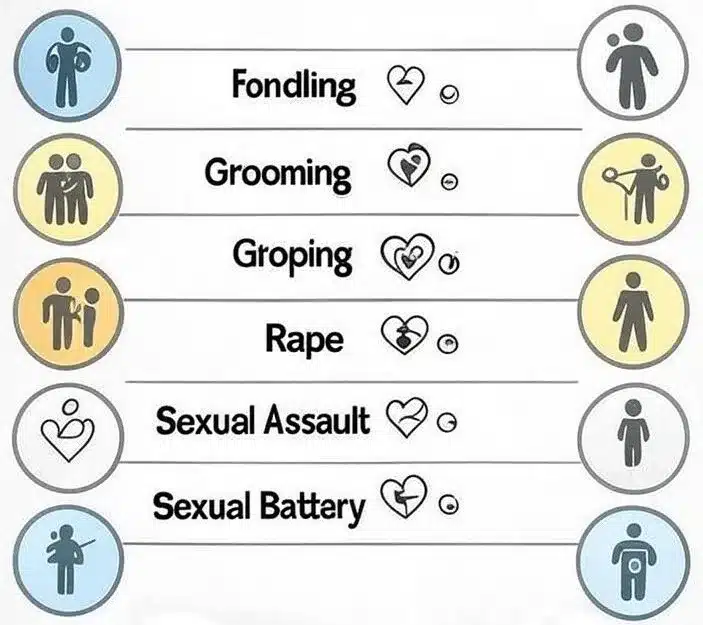- Home
- Sexual Abuse
Sexual Abuse
- Upd: September 16, 2025
-
Sarah Miller
- Fact Checked By Our Attorneys
Sexual abuse leaves deep scars that can last a lifetime, but survivors do not have to face this pain alone. Understanding what happened, recognizing the signs, and knowing your legal rights are the first steps toward healing. Many institutions that allowed abuse to happen can and should be held accountable.
At Legal Claim Assistant, we help survivors connect with experienced attorneys who fight for justice and maximum compensation. If you qualify, filing a claim can be part of reclaiming your voice and your future.
Start your free case review to find out in 2 minutes.
No Win, No Fee. Let the Best Sex Abuse Attorneys Fight for your Compensation!
Key Takeaways:
Sexual abuse can take many forms and often happens in trusted settings.
Survivors may face long term trauma but healing and support are possible.
Civil lawsuits can hold abusers and institutions accountable.
Legal Claim Assistant offers a free and confidential case review.
Find out your eligibility in 2 minutes
If you or your child has been affected by sexual abuse, you are not alone. Many survivors and families face the same pain, fear, and questions. Here you can learn how to seek justice and pursue the compensation you deserve.
Start your free case review here:

What Is Sexual Abuse?
Sexual abuse is any form of sexual behavior or sexual act forced on a child or adult without their full and informed consent.
It includes actions that are sexual in nature where one person uses power, manipulation, or force over another. Survivors may experience unwanted touching, coercion into sexual activity, or even exposure to pornography or child pornography.
Legally, sexual abuse is recognized as a serious offense that can cause lasting trauma for victims, whether they are girls or boys. Clinically, it is understood as a violation that can deeply affect emotional health, relationships, and trust.
“Sexual abuse is any forced sexual act without consent, causing lasting trauma and broken trust.”
Sexual Abuse vs. Sexual Assault
While often used interchangeably, these terms can differ depending on state law. Sexual abuse typically refers to ongoing patterns of harmful behavior, often involving minors or vulnerable individuals.
Sexual assault more commonly refers to a single assault or forced sexual act, such as rape. Both are forms of sexual violence, but survivors may encounter them differently in legal definitions.
Degrees of Sexual Abuse
Different states classify sexual abuse into varying degrees. These categories reflect the severity of the sexual activity or sexual act, the age of the victim, and the role of the perpetrator.
- First-degree sexual abuse – most serious, often involving penetration or abuse of very young children.
- Second-degree sexual abuse – may involve coercion, sexual stimulation, or abuse of minors under a certain age.
- Third-degree sexual abuse – includes non-penetrative sexual activity or misconduct with teenagers or vulnerable adults.
Are you worried you or your child suffered sexual abuse? Protect your rights and hold abusers accountable by filing a claim today!
Types of Sexual Abuse
Sexual abuse can take many forms. What matters most is that the offender acts with intent to exploit someone for sexual nature purposes without their ability to freely consent. Abuse may be perpetrated against women, men, or children, and it can occur in families, schools, religious organizations, or the workplace.
Survivors may face long-term depression, fear, shame, or even suicide risk, no matter the type of abuse. Below are the most common categories of sexual abuse, each with unique patterns of harm and legal recognition.
Fondling
Fondling refers to unwanted touching of intimate body parts, such as the vagina, vulva, mouth, or anus, without consent. This often involves child sexual abuse, where victims are too young to understand or respond.
[Learn more about fondling →]
Grooming
Grooming is a calculated process where an offender slowly builds trust before abuse begins. It may involve giving gifts, providing education or attention, or isolating a victim from friends and family. Grooming often leads to severe confusion and embarrassment, making it difficult for survivors to recognize or report.
[Learn more about grooming →]
Groping
Groping involves unwanted physical advances or sexual harassment, often in public spaces or private encounters. This behavior can be committed by strangers, coworkers, or even trusted community members. Survivors often experience harm to their sense of safety, especially in environments where alcohol is present.
[Learn more about groping →]
Rape
Rape is the most severe form of sexual abuse, defined legally as forced penetration of the vagina, anus, or mouth, with a body part or objects, without consent. It may result in pregnancy, physical injury, or deep psychological trauma. Cases of statutory rape occur when the victim is under the legal age of consent, regardless of whether they seemed to engage willingly.
[Learn more about rape →]
Sexual Assault
Sexual assault is a broad umbrella under criminal law that covers a range of unwanted sexual acts. It may include exhibitionism, voyeurism, coerced sexual activity, or attempted rape. Assault is legally defined differently depending on the jurisdiction, but all survivors deserve recognition and support.
[Learn more about sexual assault →]
Sexual Battery
Sexual battery is a specific legal term used in many U.S. states. It often refers to non-consensual sexual activity that doesn’t involve penetration but still causes significant harm. Definitions may vary by jurisdiction, but the underlying matter is the same: an offender intentionally violated someone’s right to safety and dignity.
[Learn more about sexual battery →]

Sexual Abuse in Institutions and Communities
While sexual abuse can happen anywhere, survivors are often most at risk in institutions where trust, authority, and dependency create opportunities for exploitation. In these environments, children and vulnerable adults may be sexually abused by leaders, caregivers, or peers. Too often, there is a lack of oversight, and attempts at prevention have failed or were never fully developed.
One of the most difficult realities is that many survivors trusted the very organizations that later caused them harm. Some were discouraged to talk, others were silenced, and in many cases there was clear evidence of abuse that was ignored or covered up.
Sexual abuse in Religious Institutions
- Southern Baptist Sex Abuse – widespread church scandals where leaders failed to protect children.
- Catholic Church Abuse – decades of systemic abuse, secrecy, and cover-ups affecting multiple races and communities.
- Mormon Church Abuse – LDS-related cases where cultural honor and authority discouraged reporting.
- Jehovah Witness Sexual Abuse – patterns of silencing survivors and discouraging outside investigation.
- Clergy Sexual Abuse – abuse across denominations, exposing failures in accountability.
Sexual abuse in Educational Settings
- Sexual Abuse in Schools – incidents involving teachers, staff, and peer-to-peer misconduct.
- Daycare Abuse – very young children targeted, often too small to describe what happened.
- Teacher Abuse – abuse of authority in teacher-student relationships.
- Boarding School Abuse – isolated environments where survivors had few trusted adults to visit or confide in.
- University Sexual Abuse – high-profile campus scandals highlighting gaps in policy and prevention.
Sexual abuse in Care Systems
- Foster Care Abuse – children in state care exposed to abuse from guardians or peers.
- Juvenile Detention Abuse – abuse inside detention centers, often hidden behind closed doors.
Sexual abuse in Camps and Sports
- Camp Assault – abuse during retreats or summer programs, often with little supervision.
- Youth Sports Sex Abuse – misconduct by coaches, trainers, and leaders in scouting organizations.
- Boy Scout Abuse – decades of child sexual abuse by trusted scout leaders.
Signs and Symptoms of Sexual Abuse
Sexual abuse is not always easy to recognize. Survivors may be too afraid, too ashamed, or too young to explain what happened. Still, there are patterns and warning signs that families, teachers, and communities should not ignore.
Physical indicators may include unexplained injuries, pain when walking or sitting, frequent medical complaints, or sudden changes in hygiene.
Emotional and behavioral changes can be even more telling. Survivors might withdraw from friends and family, show bursts of aggression, or display unusual knowledge of sexual behavior for their age. Some may become anxious, depressed, or even hypersexual as a coping response.
When these signs appear in a child, they should be taken seriously and addressed immediately. [Learn more about child sexual abuse →]
Effects of Sexual Violence
Being sexually abused leaves scars that extend far beyond the initial incident. Survivors often face both immediate and lifelong challenges.
Psychological trauma such as PTSD, depression, and anxiety is common. Nightmares, flashbacks, and ongoing fear may interfere with daily life.
Physical consequences can include sexually transmitted infections, unintended pregnancy, and chronic pain. The stress of abuse also affects the immune system and overall health.
Long-term impacts on trust and relationships are equally significant. Many survivors struggle with intimacy, boundaries, and self-worth, often carrying feelings of shame or confusion into adulthood.
Recent research by organizations such as the APA shows that childhood trauma can alter brain and neurological development. Survivors may later experience difficulties with concentration, memory, and emotional regulation, underscoring how deeply abuse affects the body and mind.
“Sexual violence leaves scars far beyond the incident, affecting the body, mind, and relationships for a lifetime.”
Why Survivors Often Struggle to Report
Despite the devastating harm, most sexual abuse is never reported. The reasons are complex and deeply personal.
Shame and stigma keep many silent. Survivors may blame themselves, or fear judgment from their family, community, or faith group.
Fear of retaliation or disbelief is another barrier. When the perpetrator is a parent, teacher, or clergy member, survivors may believe no one will listen or worse, that speaking out will cause more harm.
Institutional pressure adds to this silence. Schools, churches, and other organizations sometimes prioritize reputation over accountability, discouraging survivors from coming forward even when strong evidence exists.
Finally, the Statute of Limitations creates a legal hurdle. Survivors may wait years before they are ready to talk, only to find they have little time left to pursue justice.

Legal Pathways for Survivors
When someone has been sexually abused, the law provides two main paths to accountability. A criminal case focuses on punishing the offender, often through investigation, trial, and sentencing. A civil case, on the other hand, allows the survivor to seek financial compensation for the harm caused.
Civil lawsuits are especially important because they can also hold institutions responsible if they allowed the abuse to happen or failed to act when it was reported. A lawsuit may be possible when the abuser is known, when the abuse occurred at an institution that still operates today, and when the survivor is still within their state’s Statute of Limitations.
These deadlines vary, but in plain terms they set a legal time limit for filing a case. Survivors who wait too long may lose the chance to take legal action, even with strong evidence. Legal Claim Assistant helps survivors understand whether they still qualify and connects them with experienced attorneys who can guide them through the process.
[Learn more about filing a sexual abuse lawsuit →]
“Survivors have two legal paths: criminal cases punish offenders, while civil lawsuits provide compensation and hold institutions accountable.”
Healing and Recovery After Sexual Abuse
Recovery after sexual abuse is deeply personal and often takes time. Many survivors benefit from trauma-informed therapy, which provides a safe place to process fear, shame, or anger. Others find strength in support groups, where they meet people who understand what it means to live through abuse.
Healing is not only about emotional care. For some survivors, legal justice becomes part of recovery, helping them reclaim power and find validation in a system that recognizes the harm they endured. Although there is no single way to heal, combining emotional support with legal action can give survivors both peace of mind and a sense of justice.
How to Report Sexual Abuse
For many survivors the idea of reporting sexual abuse feels overwhelming. Fear, shame, and past experiences of not being believed often make this step incredibly difficult. Yet reporting is often the first step toward protection and accountability.
If there is an immediate risk of danger, contacting the police or child protective services can bring urgent help. These authorities have the power to investigate and intervene quickly to protect children and vulnerable adults.
In some cases survivors disclose abuse to schools, churches, or youth organizations. While these are important channels, history has shown that not all institutions act responsibly. Survivors should know they have the right to seek outside help if they feel their report is being ignored.
Another option is to speak with a lawyer. Confidential legal intake is designed to give survivors a safe, private space to share their story and explore their rights without committing to immediate action. This conversation can help clarify the next steps and protect important legal options before time runs out.
If you are considering reporting, here are three common paths:
- Emergency help through law enforcement or child protective services when someone is in immediate danger.
- Institutional channels such as schools, religious organizations, or youth programs, though these may not always provide adequate protection.
- Confidential legal consultations with an attorney to understand rights and explore whether a civil or criminal case is possible.

How to Prevent (Child) Sexual Abuse
Preventing sexual abuse is a shared responsibility. Families, communities, and institutions all play a vital role in creating safer environments. At home, teaching children and vulnerable adults about body safety and personal boundaries helps them recognize when something is wrong. Equally important is that adults remain alert, able to recognize grooming behaviors, and willing to speak up before abuse escalates.
Institutions carry a special duty of care. Schools, camps, churches, and sports organizations must enforce strict codes of conduct, carefully screen staff and volunteers, and act quickly when concerns are raised. Ignoring warning signs or protecting reputations instead of people only increases the risk of harm.
Communities can also make a difference by creating open conversations about abuse. When survivors are believed and supported, and when prevention is treated as a collective priority, the chances of abuse being hidden or ignored decrease. By combining education, vigilance, and accountability, prevention becomes stronger and more effective.
“Prevention is strongest when families, institutions, and communities work together to protect children.”
Get Legal Help After Beeing Sexually Abused
If you or someone you love has been sexually abused, know that you are not alone and that support is available. Many survivors qualify for legal compensation that can help cover the cost of therapy, medical care, and the lifelong impact of trauma. Speaking with a lawyer does not mean you are forced into a lawsuit. It simply gives you the chance to understand your rights and decide what path feels right for you.
Legal Claim Assistant offers a confidential case review where survivors can share their story safely and learn whether they qualify for a claim. If the case meets the legal criteria, we connect survivors with trusted attorneys who have the experience to pursue justice and hold institutions accountable.
Taking this step is often easier than it seems. You can:
- Request a free and confidential case review.
- Learn whether you may qualify for financial compensation.
- Get connected with an experienced sexual abuse attorney who will guide you through the process.
Related Article

What Philips CPAP Machines Are Recalled and Why

